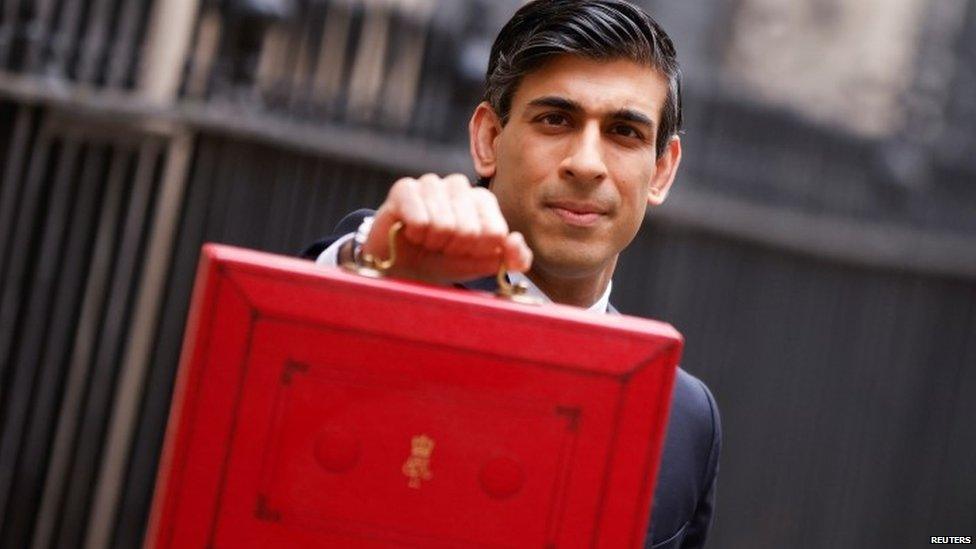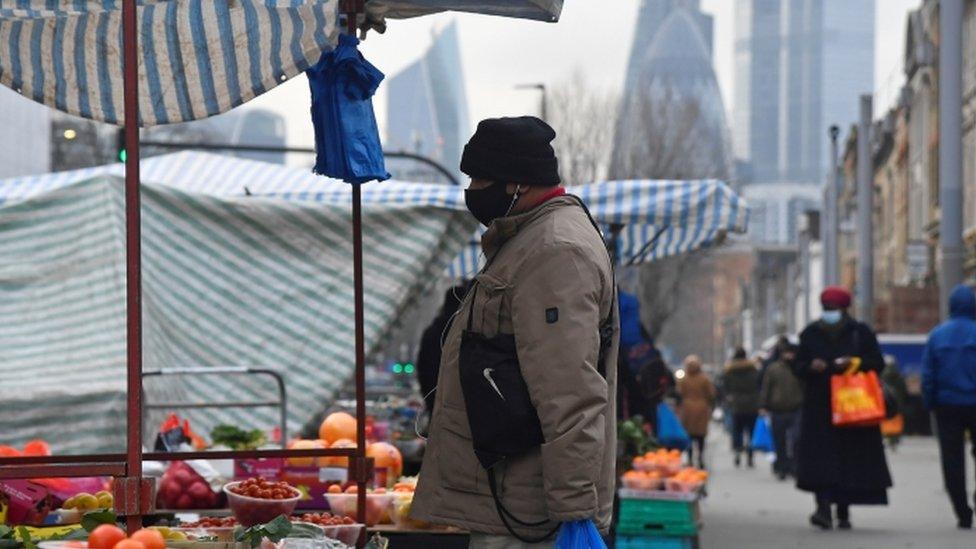Budget 2021: What is it and when will it happen?
- Published

On Budget day the chancellor usually holds up a traditional red box full of financial documents
On Wednesday, Chancellor Rishi Sunak will unveil his Budget.
He'll say how much of our money the government will take in taxes, and what they will spend it on.
What is the Budget?
Each year, the chancellor of the exchequer - who is in charge of the government's finances - makes a Budget statement to MPs in the House of Commons.
It outlines the government's plans for raising or lowering taxes. It also includes big decisions on what the government will spend money on - including health, schools, police and other public services.
When is the Budget?
The Budget speech will be delivered on Wednesday 27 October.
It usually starts at about 12:30 UK time and lasts about an hour. Labour leader Sir Keir Starmer will give his response straight afterwards.
This year's Autumn Budget is unusual for two reasons:
It's the second of the year - there was a Budget in March too
It comes on the same day as the results of a spending review, external, which details how government will fund public services for the next three years
After the speech, the independent Office for Budget Responsibility (OBR) - which monitors government spending - will publish a report on how the economy is doing.
What could be in this Budget?
The Budget is likely to include help to support businesses and individuals recover from the economic effects of Covid.
A number of measures have been announced in advance of the Budget, including a rise in the minimum wage from £8.91 per hour to £9.50 and an end to the public sector pay freeze.
The chancellor will likely set out some more details of the government's long term ambitions:
Reducing the UK's net greenhouse emissions to zero by 2050 to combat climate change
Levelling up - bringing jobs and investment to the poorer regions of the UK.

Though many businesses are open again, the impact of the pandemic on government finances will last for years
Are we still paying for the pandemic?
Measures such as the furlough scheme - which finished at the end of September - were expensive, and government income is down because it collected less money in tax during the pandemic.
To close the gap between higher spending and less money, the government has had to borrow more.
In the year ending April 2021, the government borrowed £320bn - the highest figure seen outside wartime.
Economists expect it to borrow around £180bn more this year, another enormous sum.
During his Budget speech, the Chancellor will set out the latest borrowing forecasts for the years ahead.
Will taxes go up or down in the Autumn Budget?
The government needs to cut the gap between what it spends and what it raises.
One major tax rise was announced in September - the £12bn Health and Social Care Levy. This broke a promise the Conservatives made at the last election, not to raise the three biggest taxes - income tax, national insurance and VAT.
There has been speculation that graduates may be asked to start paying back student loans earlier.
At the same time, the cost of living is rising. So the chancellor may want to cut some taxes, such as the amount of VAT pay on energy bills.
He is also expected to announce major changes to the complicated alcohol tax system, which could see sparkling wine become cheaper.
Will spending be cut in the Budget?
Overall government spending will rise next year, with big increases already announced for health and schools in England.
The government has already said that the NHS in England will receive an extra £5.9bn to help clear the record backlog of people waiting for tests and scans.
But other government departments, such as courts, prisons, local government and transport, are braced for cuts to their day-to-day budgets next year.
They have already faced a decade of tight spending, and making further cuts will be painful.

Could alcohol duty be reformed in the Budget?
Does the Budget affect all parts of the UK?
Some parts of the Budget, such as defence spending, affect the whole of the UK.
Others, such as education, only affect England. This is because Scotland, Wales and Northern Ireland make their own decisions.
Scotland has income tax-raising powers, which means its rates differ from the rest of the UK. The Scottish government will publish its Budget on 9 December.
If the government announces extra spending on areas that only affect England, the other nations get an equivalent extra sum of money to spend as they choose, according to a rule called the Barnett formula.

Are you affected by issues covered in this story? Do you have any questions for our experts? Email haveyoursay@bbc.co.uk, external.
Please include a contact number if you are willing to speak to a BBC journalist. You can also get in touch in the following ways:
Tweet: @BBC_HaveYourSay, external
Please read our terms & conditions and privacy policy
If you are reading this page and can't see the form you will need to visit the mobile version of the BBC website to submit your question or comment or you can email us at HaveYourSay@bbc.co.uk, external. Please include your name, age and location with any submission.
- Published22 January 2021
